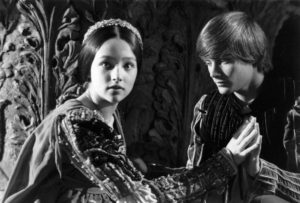For reasons too complicated to mention I was fast forwarding through King Lear with the kids last night, jumping to the ending. I knew it wouldn’t really capture their attention the way I hoped, and I’d have to explain 90% context, but I’m ok with that :).
complicated to mention I was fast forwarding through King Lear with the kids last night, jumping to the ending. I knew it wouldn’t really capture their attention the way I hoped, and I’d have to explain 90% context, but I’m ok with that :).
Which gave me an idea, as I explained how Cordelia died. Shakespeare gives us lots of action off stage, for whatever reason. Sometimes modern directors will go ahead and add the scene to make things easier to follow – I’m thinking of Romeo and Juliet‘s wedding scene as an obvious example. Many people will swear that they’ve seen Romeo and Juliet’s wedding and refuse to believe that Shakespeare never wrote that scene, because it was in the 1996 movie.
What other scenes fit the bill? I’d love to see Lear’s last desperate act trying to protect his daughter. I can see the whole thing quite clearly (having just watched Olivier’s version doesn’t hurt). Cordelia and Lear are sitting happily in a cell. Enter guard with a rope, who roughly pulls her away despite Lear’s protests. He tries to protect her but is no match for the guard who hurls him back to the ground. The guard struggles with Cordelia and drops his sword so he can use both hands (having been ordered to hang her, not stab her). Behind his back Lear recovers the sword and does the scoundrel in, just as the messenger from Edmund (et al) arrives screaming for them to stop the execution.
What else? Petruchio and Kate’s wedding scene writes itself, that’s an easy one. Then you have Macduff beheading Macbeth, but I don’t think of that one as a really necessary scene, there’s just not much to it.
Which ones am I missing?

The murder of King Duncan and later King Duncan’s guards are not actually performed on stage in Macbeth. Yet, adding those little details can show a lot of how ruthless/unsure the character Macbeth might be at those moments in the play. Plus if I’m not mistaken the only killing Macbeth does on stage (as opposed to hiring others to do) is to Young Siward.
I adapted a play where I pulled Shylock’s story out of Merchant and followed him as if he were the protagonist (along with a couple other Shakespearean antagonists and their story lines). I added a silent scene after the trial where Shylock has all his belongings taken by the city, down to his yarmulke at the very end. I was lucky to have a very charming actor as Shylock, who made his downfall in the added scene truly tragic.
In ‘The Comedy of Errors’, I’d like to see Nell chasing the wrong Dromio around the kitchen.
I have seen her added to productions; of course, she can’t live up to Dromio’s description of her.